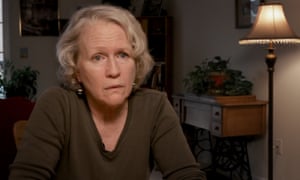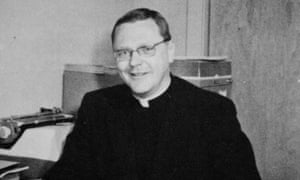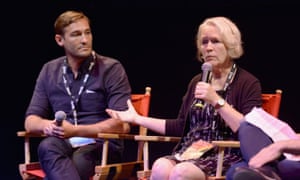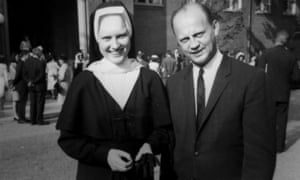The Keepers: 'I've dealt with survivors and they're sickened by the church's response' | Television & radio
On the day The Keepers was released on Netflix, the archdiocese of Baltimore tweeted that although it did not deny allegations of child abuse against Father Joseph Maskell, a priest who worked in the city for decades, the premise and conclusion of Ryan White’s documentary series were “wrongâ€. The account @archbalt included, bizarrely, a clipart picture of a checklist, and a hashtag, #TheKeepersUntold. It has continued to use this hashtag, along with another, #TheKeepersTruth, since the series came out.
It’s easy to see why this astonishingly powerful seven-parter has led to what White, over the phone from his home in Los Angeles, calls a church in “defensive attack modeâ€. The Keepers initially begins as a Making a Murderer or The Jinx-style true-crime whodunnit, promising an investigation into the unsolved 1969 murder of Sister Cathy Cesnik, a Baltimore nun and teacher. But it quickly reveals itself to be much bigger, and more far-reaching, than that, exposing decades of child abuse within institutions across Baltimore, from the church to the police force, and distressingly, the extent to which they colluded in silencing the victims and covering up such horrific crimes. “As you’ve seen now, on paper especially, it’s a pretty unbelievable story. It’s captivating, for sure,†White says.
White’s previous work includes Serena and The Case Against 8. He came to the story through a personal connection: both his aunt and mother went to Archbishop Keough high school, where Maskell and Cesnik taught and where much of the abuse documented in the film was alleged to have taken place. White’s aunt was a student of Cesnik’s and he says that there had always been local interest in the Sister Cathy story. In particular, he and his family had been intrigued by the identity of “Jane Doeâ€, an anonymous former Keogh student whose allegations of abuse against Maskell resulted in a 1994 court case, in which she sued Maskell and the archdiocese of Baltimore for covering up the abuse. Doe claimed that Cesnik had discovered what was going on in the school, and that Maskell had taken her to Cesnik’s dead body as a warning against speaking out. The case was dismissed.
“People like my aunt and my mom had always wondered,†White explains. In 2014, Tom Nugent, an investigative journalist who appears in the series, published a blog in which Jane Doe revealed her identity. She was Jean Wehner, a classmate of White’s aunt. “That’s when they found out their friend was Jane Doe.†His mother said Wehner had a story to tell and, curiosity piqued, White flew from Los Angeles to Baltimore and spent five hours at her house. “On the way back, my producer and I both agreed right away that if she wanted to do something, we wanted to be her partners in it. I felt like she was a person who was incredibly honest and raw, and once I’m drawn to a person like that, that’s when I know it’s the starting point of a documentary.â€

During the course of the series, we hear that Wehner only began to remember the abuse that had taken place many years later, and this notion of repressed memory â€" memories that have been blocked out by trauma, only to later re-emerge â€" was given as the reason for the 1994 lawsuit being dismissed. White acknowledges that it was initially a foreign concept to him. “I wondered if you could really witness and experience something that gruesome, and not know you had lived it. I’m not a psychologist, so I can’t get into the science, but I will say that now I’ve made The Keepers, I cannot tell you how many people in my life have come forward with the same stories.â€
Wehner, he says, is a prime example of that. “She was the first person ever to come forward publicly with an allegation against Father Maskell and she’s been corroborated by dozens, if not hundreds. People can prove that it happened to them, and they are telling us that there were certain parts of their lives where they weren’t aware of it.â€
White spent three years making The Keepers, and it took over his life. He assumed â€" naively, he says now â€" that once the series was out there, that would be an end to it. “I guess I kind of fooled myself into thinking the day it was released was the day I’d be able to look up and see the world again,†he laughs, wryly. “Instead, it got more personal when it came out, and it got even more nauseating. I was unprepared for the type of personal reaction that people would have to it.†His email inbox regularly fills with people asking him to investigate their own stories of abuse, or asking him to put them in touch with Wehner. Eventually, the production team sought professional help from NGOs and non-profit organisations specialising in working with survivors. “I know that I can’t be that for all of these strangers out there in the world,†he says, “so it’s about getting them the resources they need as soon as possible.â€

The Keepers is harrowing, documenting awful violence and abuse. I recently heard someone describe it as “brilliantâ€, and follow that immediately with “don’t watch itâ€. White was well aware of its potential impact. “We knew we had found something very sad, but also very powerful, that could lead to a lot of change,†he says. The sheer scope of the story The Keepers ends up telling â€" a cover-up of child abuse on a mass scale within the Catholic church; a new Spotlight, of sorts â€" became frightening to him.
“I’ll say it, I was afraid,†says White. “I was afraid many times during filming. I was probably afraid through the entire filming. You always had the sense that we were rooting around in something people didn’t want us rooting around in. It was definitely the most uncomfortable I’ve been in my film-making career.â€
White says, though, that it’s important to realise the experience was not all doom and gloom. “Jean is probably one of the most fun people I’ve ever met in my life,†he says. “She and I can drink wine all day long.†Indeed, one of the series’ most memorable scenes is also one of its few instances of humour. When Wehner is told that the church had known about earlier abuse allegations against Father Maskell, she half-laughs, and finally yells: “Those fuckers!â€

It’s an incredible moment of catharsis. “It was one of the few moments where anger overcame Jean, and she was willing to show it,†says White. “She and I keep laughing so hard, because that clip has gone viral. I was like: ‘Jean, who would have thought you dropping the F-bomb would be all over the internet?’ Because she’s a grandma, you know? That’s not Jean. That’s what’s been done to her. That’s what all of this horrible trauma has caused.â€
Although the initial premise of The Keepers appears to be “Who killed Sister Cathy?â€, it’s really Wehner’s story, and it ends when it does, with no solid conclusions, says White, because Wehner felt as if she had said all she could say at this time. “We don’t have that neat, The Jinx-style ending [in which the suspected murderer is caught on-mic apparently confessing to his crimes] where somebody confesses they killed Sister Cathy, but it felt like Jean’s journey was wrapping up, so we said: ‘Let’s release this to the world, and see how the world reacts, even though there aren’t neat endings to the true-crime part.â€
The world has certainly reacted. One consequence of true-crime dramas such as Serial and Making a Murderer is that they tend to turn their army of viewers and listeners into amateur sleuths. Is it ethical to place real crimes in the hands of an audience? White has not had time to really fall into the Reddit “rabbit hole†yet, he says, and understands that it’s a tricky area. “The way I really justify it is that The Keepers is a story about women being silenced, right?†he says. “All of the women I’ve worked with, all of the survivors that I became so close with, over the last three years, are proud of the product. They feel it’s finally giving them a voice. Those are the people who matter the most. If there are other people being held to a flame in some way because of their failures, that’s what accountability is.â€
He sounds truly astonished that it has taken this long. “Maskell died a free man under the care of the archdiocese [in 2001]. If people have to finally answer the tough questions, or the institutions in power have the public questioning them at this point, then I’m learning to be comfortable with the fact that that’s what should have happened long ago.â€
The response of the archdiocese of Baltimore has been surprising, to say the least. “People in churches and schools in Baltimore started sending us literature that the archdiocese was sending out, on how to tell people what we got wrong. The documentary wasn’t even out. I just found it incredibly disappointing.†The @archbalt account retweeted a message that called the series “fictionâ€, a spokesperson subsequently admitting that this was “bad judgmentâ€. “They’re trying to re-message. They’ve lost. It’s too late now,†says White. “All I know is that I’ve dealt with between 35 and 40 survivors and they’ve all been sickened at the archdiocese’s responses. I’ve spent way too much time on phone calls with people I worked with in tears, because this institution continues to torture them, and I don’t understand why.â€
What makes this all the more disappointing for White is that he was raised in the church and his own experience was positive. “I wasn’t a practising Catholic, I had wandered away from the church in my 20s but still had fondness for it.†And now? “I won’t be a part of that church again. My faith has been shattered.†Does he think the cover-up goes all the way to the top? “The only responses we’ve seen to our documentary are from the archdiocese of Baltimore. What is the Vatican response? I don’t know how high it goes, I won’t even speculate on that, but I would like to hear from the Catholic church that reigns over the archdiocese of Baltimore, why they haven’t made a response to it.†Incidentally, shortly after I spoke with White, the pope’s chief financial adviser, Cardinal George Pell, announced that he would take a leave of absence following multiple accusations of historical sex crimes.

As for the murder of Sister Cathy Cesnik, White says he has his own theory about who did it, and believes Maskell was certainly involved. Since the documentary came out, Maskell’s body has been exhumed to allow DNA testing on evidence found at the murder scene. There was no match. White says nobody really believed they would find evidence of Maskell’s presence at the murder scene, but it does show that the police are taking it seriously, and spending time and money on trying to crack the case. So, are we any closer to knowing who killed Sister Cathy?
“What The Keepers has done is blown the lid off of Baltimore, really shaken the branches of information, and I think people are seeing things, remembering things that they didn’t even know played a role in this,†says White. “So, I think we are closer. Whether that means we ever solve it and someone goes to jail, I can’t guarantee that. But the amount of information and progress we’ve seen just in the weeks since it came out, says to me that this cold case can still be solved.â€
The Keepers is available now on Netflix

0 Response to "The Keepers: 'I've dealt with survivors and they're sickened by the church's response' | Television & radio"
Posting Komentar